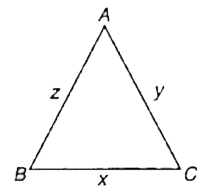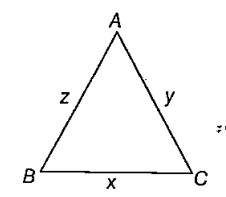If x,y,z are real numbers satisfying the equation 25(9x2+y2)+9z2−15(5xy+yz+3zx)=0 then prove that x,y,z are in AP.
To prove that x,y,z are in arithmetic progression given the equation:
25(9x2+y2)+9z2−15(5xy+yz+3zx)=0,
we can follow these steps:
Step 1: Rewrite the equation
We start by rearranging the given equation:
25(9x2+y2)+9z2−15(5xy+yz+3zx)=0.
This can be rewritten as:
25⋅9x2+y2+9z2−15(5xy+yz+3zx)=0.
Step 2: Identify the quadratic form
Notice that the expression can be represented in a quadratic form. We can express it as:
(15x−5y)2+(5y−3z)2+(3z−15x)2=0.
Step 3: Analyze the quadratic form
Since the sum of squares is equal to zero, each square must also be equal to zero:
15x−5y=0,
5y−3z=0,
3z−15x=0.
Step 4: Solve the equations
From the first equation, we can express y in terms of x:
15x=5y⟹y=3x.
From the second equation, we express z in terms of y:
5y=3z⟹z=53y.
Substituting y=3x into the equation for z:
z=53(3x)=5x.
Step 5: Establish the relationship
Now we have:
x=x,y=3x,z=5x.
Step 6: Check the arithmetic progression
To check if x,y,z are in arithmetic progression, we need to verify if:
y−x=z−y.
Calculating both sides:
y−x=3x−x=2x,
z−y=5x−3x=2x.
Since both sides are equal, we conclude that x,y,z are in arithmetic progression.
Conclusion
Thus, we have proved that if x,y,z satisfy the given equation, then they are in arithmetic progression.
---
We start by rearranging the given equation:
Notice that the expression can be represented in a quadratic form. We can express it as:
Since the sum of squares is equal to zero, each square must also be equal to zero:
5y−3z=0,
3z−15x=0.
From the first equation, we can express y in terms of x:
Now we have:
To check if x,y,z are in arithmetic progression, we need to verify if:
z−y=5x−3x=2x.
Thus, we have proved that if x,y,z satisfy the given equation, then they are in arithmetic progression.
Topper's Solved these Questions
Similar Questions
Knowledge Check
- Question 1 - Select One
If x,y,z are positive real numbers such that x2+y2+Z2=7 and xy+yz+xz=4 then the minimum value of xy is
A1B12C14D18 - Question 2 - Select One
If x, y, z are real numbers such that x+y+z=4 and x2+y2+z2=6, then x,y,z lie in :
ANon-positiveBnon-negativeCnegativeDzero - Question 3 - Select One
Suppose pont (x,y,z) in space satisfies the equation
∣∣ ∣ ∣∣x2+1xyxzyxy2+1yzzxzyz2+1∣∣ ∣ ∣∣=5
Then (x,y,z) lies on aAplaneBStraight lineCsphereDNone of these
Find the product. (x+y−z)(x2+y2+z2−xy+yz+zx)
View SolutionIf x, y and z are real and distinct, then x2+9y2+16z2−3xy−12yz−4zx is always
View SolutionIf x2+y2+z2=xy+yz+zx , then the triangle is :
 View Solution
View SolutionIf x2+y2+z2=xy+yz+zx, then the triangle is :
 View Solution
View SolutionStatement -1 If x,y,z be real variables satisfying x+y+z=6 and xy+yz+z=8, the range of variables x,y and z are identical.
Statement -2 x+y+z=6 and xy+yz+zx=8 remains same if x,y,z interchange their positions.View Solution

